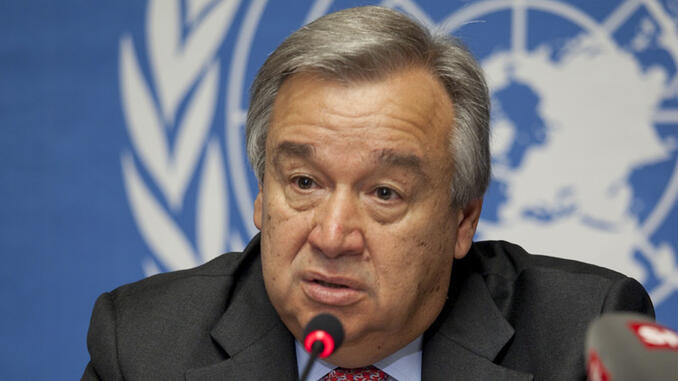
This past January as Donald Trump became U.S. President, António Guterres became the Secretary General of the United Nations. It is the first time since 1953 executive leadership has changed in the U.S. and the U.N. at the same relative time. It last happened when Dwight Eisenhower became U.S. president and Dag Hammarskjold took the reins at the United Nations. Trump campaigned against the U.N., its relevancy, and condemned Obama and the organization for the vote against Israeli settlements in December. Guterres will have to push back against what appears to be Trump’s agenda and open hostility to the organization. With a showdown seemingly looming it is important to ask, who is António Guterres?
Guterres rose through the Portuguese political ranks to become a two term Prime Minister in 1995 and served until 2002 as part of the Socialist Party. His time as Prime Minister was mostly seen as productive and successful. The Portuguese economy during that time saw expanding growth allowing the government to privatize 29 companies and to expand social programs. His foreign policy during that time is mostly marked by his campaign for the United Nations to intervene in the 1999 East Timor crises and overseeing the final agreement to return the Portuguese colony of Macau to Chinese control.
After Guterres’ years as Portugal’s Prime Minister he became President of Socialist International, an organization dedicated to strengthening and developing social democratic policies in the world. He served in that position until 2005 when he was elected as United Nations High Commissioner for Refugees.
His time as High Commissioner was spent restructuring and cutting staff and administrative costs. Most notable, as far as pop culture goes, Guterres appointed actress Angelina Jolie as his special envoy in 2012 which gained worldwide attention for the world’s ongoing refugee crises. In 2013 he launched a $5 billion initiative to help Syrian refugees—the largest refugee aid project in the history of the U.N. Iraq, Syria, the Central African Republic, and the Democratic Republic of Congo were just some of the countries experiencing refugee crises during his time as High Commissioner. In 2015, then Secretary General Ban Ki Moon extended Guterres’ time as commissioner by six and a half months because of the Syrian refugee crises in Europe. After Prince Sadruddin Aga Khan (1966-1977), this made him the second longest serving United Nations High Commissioner for Refugees in history.
Now that António Guterres is Secretary General, he comes into his current position with two particularly difficult wars in Syria and Yemen that will no doubt require delicate diplomacy between members of the Security Council. Other issues Guterres will have to handle are the United Nation’s role in spreading the devastating cholera outbreak in Haiti, and sexual assault by peacekeepers of children in the Central African Republic—two issues his predecessor, Ban Ki Moon, failed to adequately address and that remain a topic of deep institutional concern.
And then there is President Donald Trump. Based on Trump’s campaign pledges, António Guterres will have his work cut out for him working with the U.S. administration. Trump campaigned on walking back the Paris Climate Accord, the Iran Nuclear deal, and is he currently working on executive orders that would cut U.N. funding. Secretary General Guterres will have to try his best to convince Trump, and the Republican majorities in Congress, that the United Nations is still very much relevant. He will have to show that despite its flaws, the United Nations is the best way for the U.S. to advance its global agenda and share its international burdens.
The United Nations and the job of Secretary General have three main tasks: to help poor countries escape the cycle of poverty, to uphold human rights all over the globe, and to prevent war and help pick up the pieces if war cannot be prevented. There can be no doubt that this is a Sisyphean task if there ever was one. António Guterres’ predecessors have easily flopped. For many he offers hope of righting the ship, or at least taking productive steps to do so. Only time will tell.
